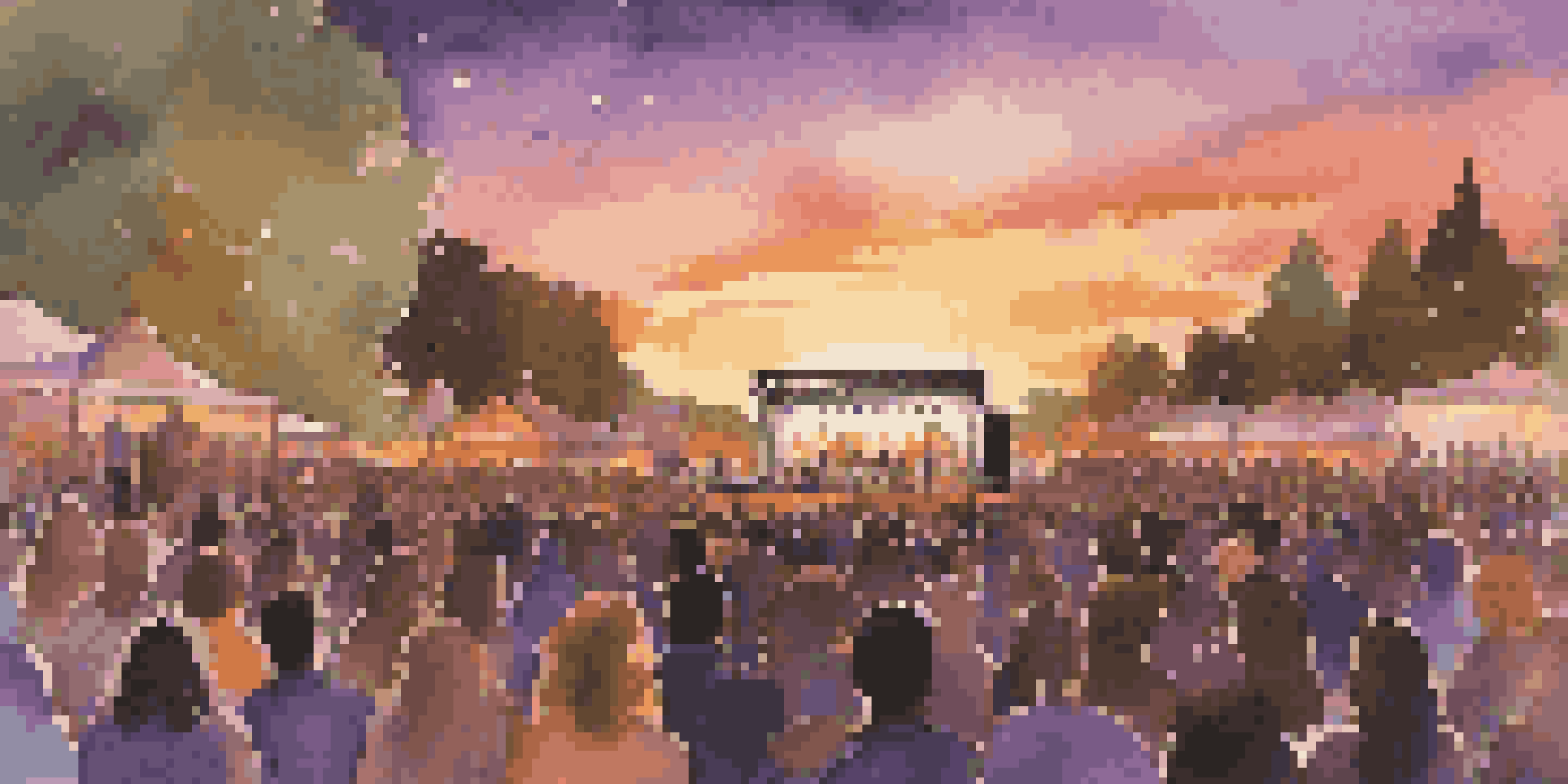How Personal Experiences Shape Musical Emotional Responses

The Connection Between Memory and Music
Music has a remarkable ability to evoke memories, often transporting us back to specific moments in our lives. For instance, hearing a song from high school can bring back a flood of nostalgia, reminding us of friends, dances, or even first loves. This connection between memory and music is rooted in how our brains process these experiences, creating strong emotional responses tied to certain melodies and lyrics.
Music can change the world because it can change people.
When we hear a familiar tune, it can trigger not only memories but also the feelings associated with those times, whether joy, sadness, or longing. This phenomenon is often referred to as the 'reminiscence bump,' where music from our formative years holds a unique place in our hearts. The deeper the emotional experience tied to a song, the more powerful our response to it becomes.
Moreover, this connection is not uniform; everyone has different songs that resonate based on their personal journeys. Thus, music becomes a soundtrack to our lives, encapsulating our experiences and shaping our emotional landscape.
Cultural Influences on Musical Interpretation
Cultural background plays a significant role in how we interpret and respond to music. For instance, someone raised in a household that values classical music may feel a different emotional connection to a symphony than someone who grew up with hip-hop. Our cultural experiences shape not only our musical preferences but also how we emotionally engage with various genres.

Different cultures also have unique musical traditions that evoke specific emotions. For example, traditional African drumming often conveys communal joy and celebration, while a melancholic tango might reflect deep sorrow and longing. These distinctions illustrate how culture can dictate the emotional responses we have to certain musical forms.
Music Evokes Powerful Memories
Music can trigger strong emotional memories, often linked to specific life experiences, creating a nostalgic connection.
As a result, when we listen to music from different cultures, we may experience a range of emotions, even if we don't fully understand the context. This opens the door to empathy and connection, allowing us to feel the emotional weight of experiences outside our own.
The Role of Lyrics in Shaping Emotions
Lyrics can play a crucial role in shaping our emotional responses to music, serving as a direct channel to the artist's feelings and experiences. When a singer shares a personal story or vulnerability through their lyrics, it can resonate deeply with listeners who have experienced similar situations. For instance, a breakup ballad might evoke feelings of heartache, while a triumphant anthem can inspire joy and motivation.
Where words fail, music speaks.
Moreover, the relatability of lyrics often enhances our emotional engagement. When we hear lines that articulate our own struggles or triumphs, it builds a sense of connection with the artist, making the music feel like a shared experience. This personal connection can amplify the intensity of our emotional responses.
In this way, lyrics serve as more than just words; they become a pathway to understanding and processing our own emotions through the lens of someone else's experience.
The Impact of Live Performances on Emotional Response
Experiencing music live can significantly enhance our emotional responses, creating an atmosphere charged with energy and connection. The shared experience of being in a crowd, swaying to the same beat, and singing along to beloved songs can heighten feelings of joy and community. This sense of belonging transforms the listening experience into something much more profound.
Live performances often evoke a unique emotional intensity that recorded music might not capture. The spontaneity of a performance, combined with the artist's energy, creates an immersive experience that can elicit powerful reactions. Whether it's tears during a heartfelt ballad or exhilaration during an upbeat anthem, the live experience can trigger emotions that linger long after the music fades.
Cultural Background Shapes Emotion
Our cultural influences determine how we interpret music and the emotions it evokes, highlighting the diversity of musical experiences.
Additionally, the interaction between the artist and the audience adds another layer to the emotional experience. When artists share personal stories or react to the audience's energy, it fosters a deeper connection, making us feel seen and understood.
Emotional Responses to Music During Life Events
Life events, both joyous and sorrowful, often shape our emotional responses to music. For example, a couple may associate their wedding song with love and happiness, while someone who has lost a loved one may hear the same song and feel overwhelming sadness. These emotional ties to music are deeply personal and can evolve over time as our relationships with these events change.
Often, we turn to music to help us navigate these emotional landscapes. During moments of grief, a comforting song can provide solace, while an upbeat track can lift our spirits during times of celebration. This ability of music to mirror and influence our emotions is a testament to its power in our lives.
As we experience more life events, our playlists become a reflection of our journey, capturing the soundtrack of our emotions. This evolving relationship with music ensures that our emotional responses remain dynamic and deeply intertwined with our life stories.
How Music Therapy Utilizes Emotional Responses
Music therapy harnesses the emotional responses we have to music as a therapeutic tool to aid healing and well-being. This innovative approach recognizes the profound impact music can have on our emotions, using it to help individuals process feelings, alleviate stress, and even manage mental health conditions. Music therapists often create personalized playlists to resonate with clients' experiences, facilitating emotional expression and connection.
In therapy sessions, clients may engage with music by listening, playing instruments, or songwriting, allowing them to explore their emotions in a safe space. For instance, someone dealing with anxiety might find relief in calming melodies, while another person may express grief through writing lyrics. This therapeutic process underscores the power of music as a catalyst for healing.
Music Therapy Aids Emotional Healing
Music therapy utilizes emotional responses to music as a tool for healing, helping individuals process feelings and promote well-being.
Moreover, music therapy can foster a sense of community, as individuals share their stories through music. This shared experience not only helps in personal healing but also builds connections among participants, enhancing emotional support and understanding.
Personal Growth Through Musical Experiences
Our personal growth is often intertwined with our musical experiences, as the songs we listen to can influence our emotions and perspectives. For instance, someone might find empowerment in an anthem that speaks to overcoming challenges, while another person might discover self-acceptance through introspective lyrics. This transformative potential of music can guide us through various stages of personal development.
Over time, our musical tastes may evolve, reflecting changes in our identities and experiences. Songs that once resonated with us during a difficult time may lose their emotional grip as we heal, while new music can help us navigate fresh challenges. This fluid relationship with music highlights its role as a companion in our growth journey.

Ultimately, engaging with music not only shapes our emotional responses but also fosters resilience and self-awareness. It encourages us to explore our feelings, connect with others, and reflect on our personal narratives, enhancing our understanding of ourselves.